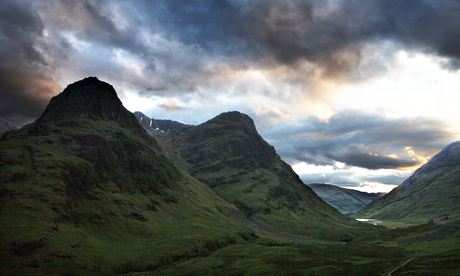
For readers of English verse, the term "war poetry" evokes a very specific set of images: mud, blood, lions led by donkeys, ferocious irony and English village greens to be defended. In effect, the canonical parameters of modern English war poetry were established during the 1914-18 period, on the back of the work of a handful of English-born male writers. In recent decades, these parameters have loosened, especially with the wider recognition of the poetry written by women during and about the two world wars. This act of recovery has expanded our view of what war poetry might be, but there is still much to be done.
Given the coincidence that sees both the centenary of the outbreak of the first world war and the referendum on Scottish independence fall in 2014, it is doubly apt that the Association for Scottish Literary Studies should have chosen this year to publish From the Line: Scottish War Poetry 1914-1945. The book, edited by David Goldie and Roderick Watson, offers an opportunity to become familiar with work which is otherwise little known, from the Whitmanesque verse of John MacDougall Hay to the stunning Elegies for the Dead in Cyrenaica by folk singer and scholar Hamish Henderson. It also enables the reader to reflect on what this poetry can tell us about the conflicting loyalties of Scottish participants in the two world wars.
The primary tension was between the poets' sense of their Scottishness as a distinct identity and their duty to defend a greater Britain. For some, the call to arms in 1914 was seen as an opportunity to, as Charles Murray put it, "show them a', whate'er befa',/Auld Scotland counts for something still." At the other end of the spectrum was George Campbell Hay/Deòrsa Mac Iain Dheòrsa , whose extreme Scottish nationalism saw him attempt to evade service in the second world war and who declared himself quite willing to see England fall to the Nazis. And yet he fought.
The anthology is marked by a rich linguistic diversity, with poems here in English, Gaelic and the Doric and Lallans Scots dialects. Sometimes this is because the poet is writing in his native language, but frequently the choice of medium reflects a self-conscious decision about identity. Many of the poets here, across both wars, were also involved in the wider movement to preserve and revivify Scottish literary culture, collecting songs and other oral texts and adapting the older tongues to the needs of 20th-century poetry.
At the epicentre of this activity stood the towering figure of Hugh MacDiarmid, and yet he is almost Banquo's ghost in the anthology. Unusually enough, MacDiarmid was actively engaged in both wars, with the Royal Army Medical Corps in the first and as a shipbuilding worker on Clydeside in the second. More unusual still, he wrote nothing that might be considered war poetry and is represented here by a section from his long poem The Kind of Poetry I Want in which he happens to mention the Nazis as being emblematic of the despotic nature of capitalist society as a whole. It is the measure of the man to be at once both central and contrarily peripheral to the narrative that emerges from the book.
MacDiarmid's vision of an independent Scotland taking its place in a pan Indo-European community of nations now seems prescient of much of the debate around the forthcoming referendum. There is a bleak inversion of this ideal in Campbell Hay's Esta Selva Selvaggia (This Savage Wood):
The swaying landmines lingering down
between Duntocher and the moon
made Scotland and the world one.
At last we found a civilisation
Common to Europe and our nation,
Sirens, blasts, disintegration.
This wider view of Scotland in the world must inevitably be predicated on a clear vision of Scotland in itself, and for many of the poets in the book this is a rural country of mountain and glen, movingly evoked by, among others, Violet Jacob and EA Mackintosh. Mackintosh's love of his country does not blind him to the facts of its history. In a poem named after the lament Cha Till Maccruimein he watches the Fourth Camerons head off to France while remembering that many such Scottish expeditions have ended in defeat and death. It's an experience shared by many small nations.
When one of the key factors in the referendum debate is the role of North Sea oil in the economy of an independent Scotland, it's hard to sustain the "mountains and glens" imagery, and Scottish poetry has certainly become more cosmopolitan, more urban and urbane, in recent decades. The appointment of Edwin Morgan (who served in the second world as a conscientious objector in the Medical Corp and so appears in From the Lines) as the first Scots Makar, the Scottish laureateship, in 2004 was a clear sign of a public commitment to a poetry that was internationalist in outlook and modernist by tradition.
And yet, it is official SNP policy to encourage reverse migration, with more people living and working in rural areas as a core part of the party's vision. A bequest of £918,000 to the SNP in Morgan's will forms part of the funding for the Yes campaign in the referendum, while down in London, Glasgow-born Carol Ann Duffy takes the Queen's metaphorical shilling as the British laureate. That tangled skein of loyalties has not unravelled yet, and poetry remains surprisingly close to the heart of it all.
The ambiguous balance between Scottishness and Britishness that From the Line reveals – often in the work of the same poet – is evident in opinion polls which continue to indicate that no clear majority favours either side, with significant numbers undecided. Whatever the results of September's vote, the ability to live with divided loyalties which emerges from these poems of 20th-century war gives hope that future political change in Scotland will be much more peaceful.

